Exploring Acute Gastritis and Viral Gastroenteritis: A Case Study
VerifiedAdded on 2023/06/05
|8
|2412
|114
Case Study
AI Summary
This case study analyzes Mr. Bob Jackson's symptoms, attributing them to acute gastritis and viral gastroenteritis. Acute gastritis, characterized by inflammation of the stomach lining, is linked to factors like alcohol consumption, NSAID use (Celebrex, Metoprolol, Ramipril), smoking, depression, and surgical history. Viral gastroenteritis, an inflammation of the stomach and intestines, is worsened by similar factors and associated with symptoms like nausea, vomiting, and abdominal pain. The study explores the impact of obesity, hypertension, and smoking on these conditions, highlighting the role of inflammation and insulin resistance. Diagnosis and potential treatments are also discussed, providing a comprehensive overview of the patient's condition and contributing factors.
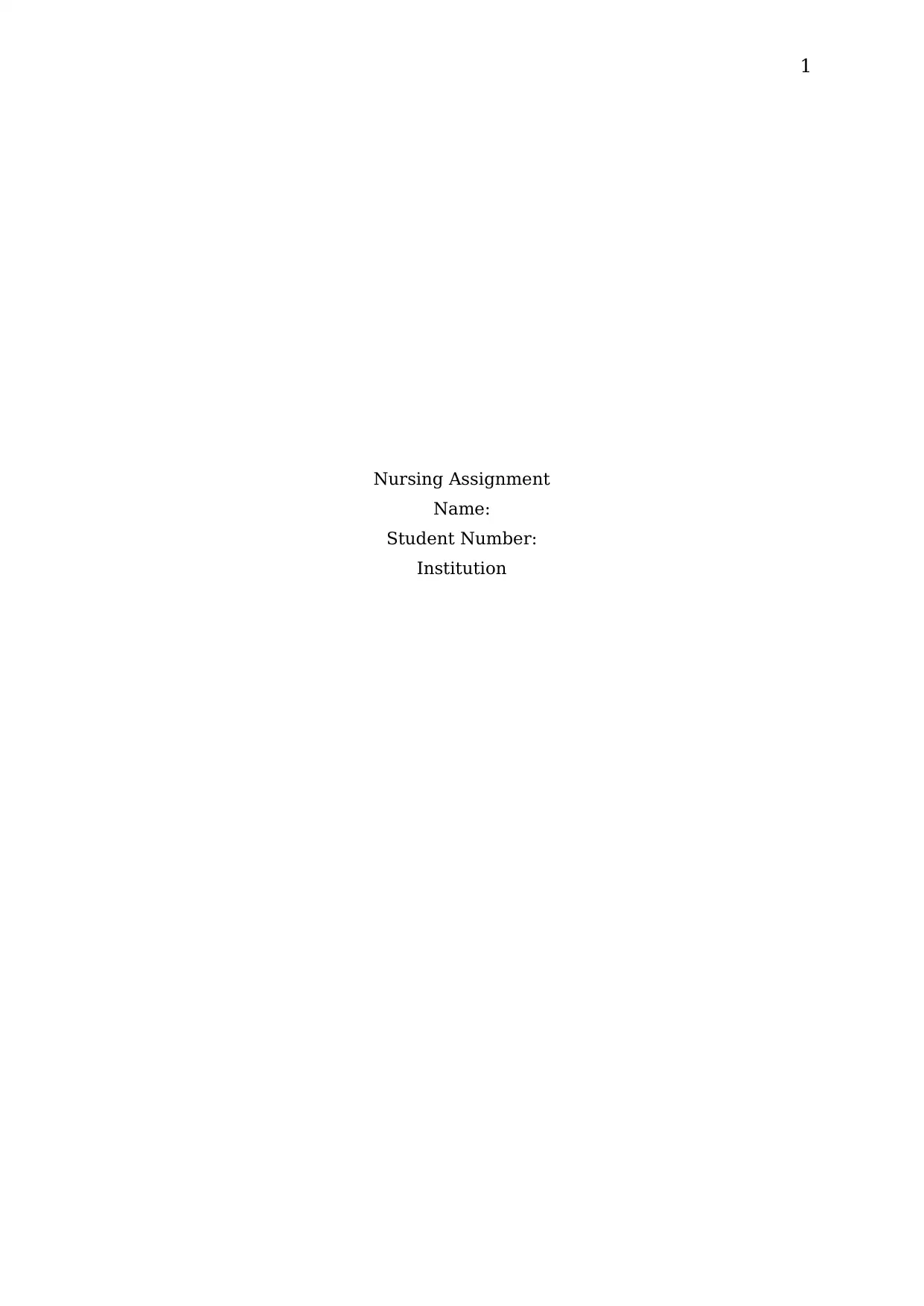
1
Nursing Assignment
Name:
Student Number:
Institution
Nursing Assignment
Name:
Student Number:
Institution
Paraphrase This Document
Need a fresh take? Get an instant paraphrase of this document with our AI Paraphraser
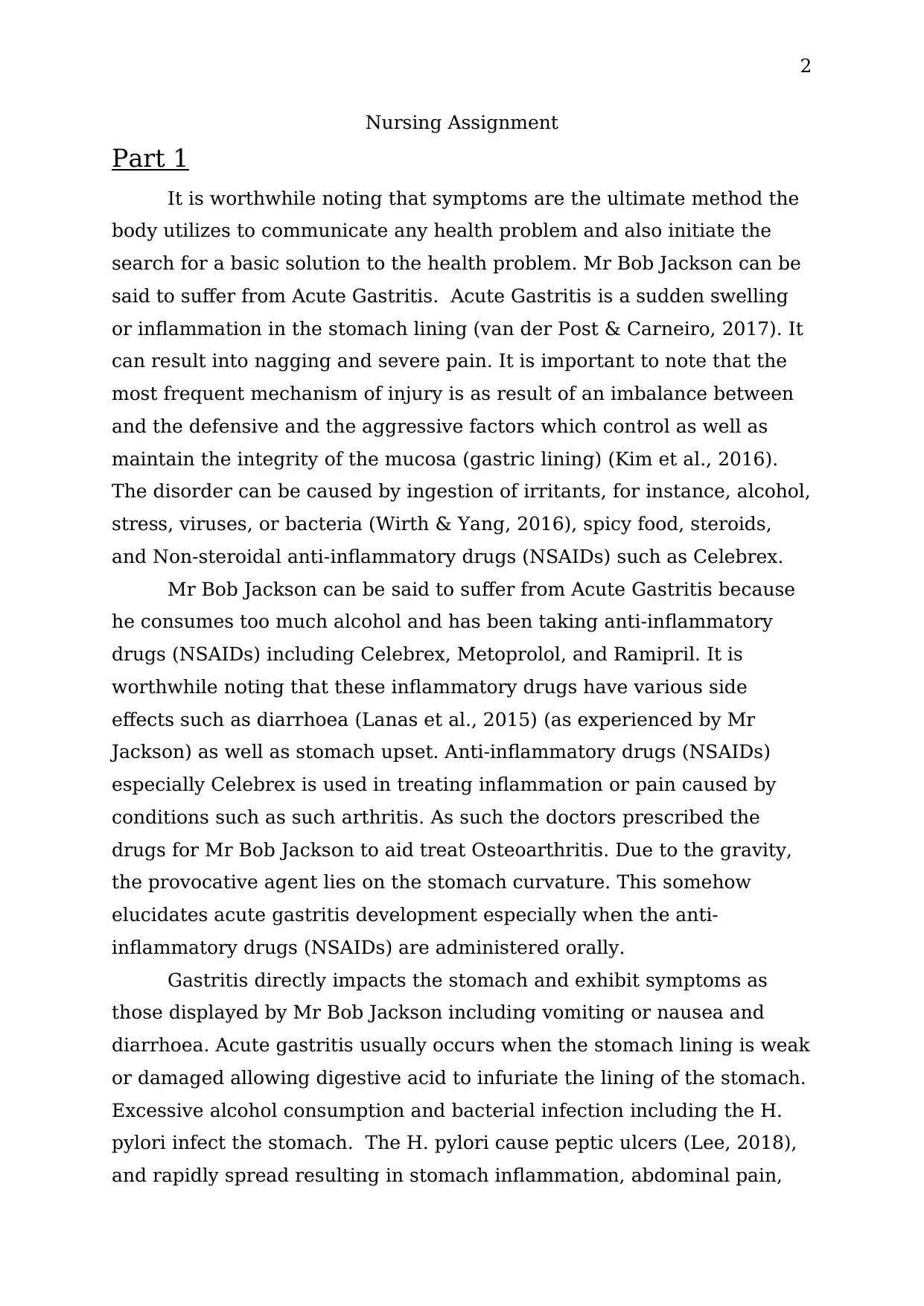
2
Nursing Assignment
Part 1
It is worthwhile noting that symptoms are the ultimate method the
body utilizes to communicate any health problem and also initiate the
search for a basic solution to the health problem. Mr Bob Jackson can be
said to suffer from Acute Gastritis. Acute Gastritis is a sudden swelling
or inflammation in the stomach lining (van der Post & Carneiro, 2017). It
can result into nagging and severe pain. It is important to note that the
most frequent mechanism of injury is as result of an imbalance between
and the defensive and the aggressive factors which control as well as
maintain the integrity of the mucosa (gastric lining) (Kim et al., 2016).
The disorder can be caused by ingestion of irritants, for instance, alcohol,
stress, viruses, or bacteria (Wirth & Yang, 2016), spicy food, steroids,
and Non-steroidal anti-inflammatory drugs (NSAIDs) such as Celebrex.
Mr Bob Jackson can be said to suffer from Acute Gastritis because
he consumes too much alcohol and has been taking anti-inflammatory
drugs (NSAIDs) including Celebrex, Metoprolol, and Ramipril. It is
worthwhile noting that these inflammatory drugs have various side
effects such as diarrhoea (Lanas et al., 2015) (as experienced by Mr
Jackson) as well as stomach upset. Anti-inflammatory drugs (NSAIDs)
especially Celebrex is used in treating inflammation or pain caused by
conditions such as such arthritis. As such the doctors prescribed the
drugs for Mr Bob Jackson to aid treat Osteoarthritis. Due to the gravity,
the provocative agent lies on the stomach curvature. This somehow
elucidates acute gastritis development especially when the anti-
inflammatory drugs (NSAIDs) are administered orally.
Gastritis directly impacts the stomach and exhibit symptoms as
those displayed by Mr Bob Jackson including vomiting or nausea and
diarrhoea. Acute gastritis usually occurs when the stomach lining is weak
or damaged allowing digestive acid to infuriate the lining of the stomach.
Excessive alcohol consumption and bacterial infection including the H.
pylori infect the stomach. The H. pylori cause peptic ulcers (Lee, 2018),
and rapidly spread resulting in stomach inflammation, abdominal pain,
Nursing Assignment
Part 1
It is worthwhile noting that symptoms are the ultimate method the
body utilizes to communicate any health problem and also initiate the
search for a basic solution to the health problem. Mr Bob Jackson can be
said to suffer from Acute Gastritis. Acute Gastritis is a sudden swelling
or inflammation in the stomach lining (van der Post & Carneiro, 2017). It
can result into nagging and severe pain. It is important to note that the
most frequent mechanism of injury is as result of an imbalance between
and the defensive and the aggressive factors which control as well as
maintain the integrity of the mucosa (gastric lining) (Kim et al., 2016).
The disorder can be caused by ingestion of irritants, for instance, alcohol,
stress, viruses, or bacteria (Wirth & Yang, 2016), spicy food, steroids,
and Non-steroidal anti-inflammatory drugs (NSAIDs) such as Celebrex.
Mr Bob Jackson can be said to suffer from Acute Gastritis because
he consumes too much alcohol and has been taking anti-inflammatory
drugs (NSAIDs) including Celebrex, Metoprolol, and Ramipril. It is
worthwhile noting that these inflammatory drugs have various side
effects such as diarrhoea (Lanas et al., 2015) (as experienced by Mr
Jackson) as well as stomach upset. Anti-inflammatory drugs (NSAIDs)
especially Celebrex is used in treating inflammation or pain caused by
conditions such as such arthritis. As such the doctors prescribed the
drugs for Mr Bob Jackson to aid treat Osteoarthritis. Due to the gravity,
the provocative agent lies on the stomach curvature. This somehow
elucidates acute gastritis development especially when the anti-
inflammatory drugs (NSAIDs) are administered orally.
Gastritis directly impacts the stomach and exhibit symptoms as
those displayed by Mr Bob Jackson including vomiting or nausea and
diarrhoea. Acute gastritis usually occurs when the stomach lining is weak
or damaged allowing digestive acid to infuriate the lining of the stomach.
Excessive alcohol consumption and bacterial infection including the H.
pylori infect the stomach. The H. pylori cause peptic ulcers (Lee, 2018),
and rapidly spread resulting in stomach inflammation, abdominal pain,
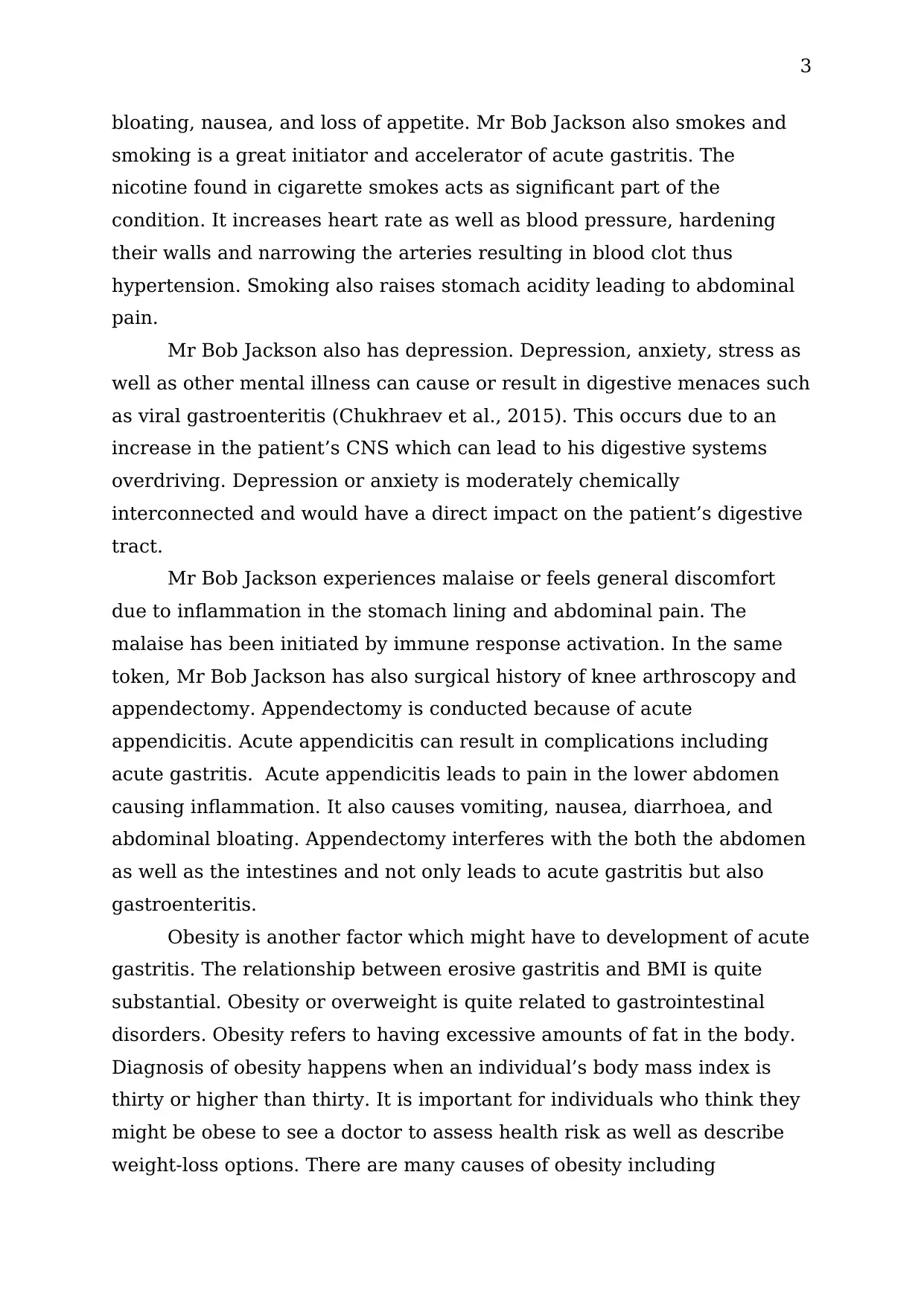
3
bloating, nausea, and loss of appetite. Mr Bob Jackson also smokes and
smoking is a great initiator and accelerator of acute gastritis. The
nicotine found in cigarette smokes acts as significant part of the
condition. It increases heart rate as well as blood pressure, hardening
their walls and narrowing the arteries resulting in blood clot thus
hypertension. Smoking also raises stomach acidity leading to abdominal
pain.
Mr Bob Jackson also has depression. Depression, anxiety, stress as
well as other mental illness can cause or result in digestive menaces such
as viral gastroenteritis (Chukhraev et al., 2015). This occurs due to an
increase in the patient’s CNS which can lead to his digestive systems
overdriving. Depression or anxiety is moderately chemically
interconnected and would have a direct impact on the patient’s digestive
tract.
Mr Bob Jackson experiences malaise or feels general discomfort
due to inflammation in the stomach lining and abdominal pain. The
malaise has been initiated by immune response activation. In the same
token, Mr Bob Jackson has also surgical history of knee arthroscopy and
appendectomy. Appendectomy is conducted because of acute
appendicitis. Acute appendicitis can result in complications including
acute gastritis. Acute appendicitis leads to pain in the lower abdomen
causing inflammation. It also causes vomiting, nausea, diarrhoea, and
abdominal bloating. Appendectomy interferes with the both the abdomen
as well as the intestines and not only leads to acute gastritis but also
gastroenteritis.
Obesity is another factor which might have to development of acute
gastritis. The relationship between erosive gastritis and BMI is quite
substantial. Obesity or overweight is quite related to gastrointestinal
disorders. Obesity refers to having excessive amounts of fat in the body.
Diagnosis of obesity happens when an individual’s body mass index is
thirty or higher than thirty. It is important for individuals who think they
might be obese to see a doctor to assess health risk as well as describe
weight-loss options. There are many causes of obesity including
bloating, nausea, and loss of appetite. Mr Bob Jackson also smokes and
smoking is a great initiator and accelerator of acute gastritis. The
nicotine found in cigarette smokes acts as significant part of the
condition. It increases heart rate as well as blood pressure, hardening
their walls and narrowing the arteries resulting in blood clot thus
hypertension. Smoking also raises stomach acidity leading to abdominal
pain.
Mr Bob Jackson also has depression. Depression, anxiety, stress as
well as other mental illness can cause or result in digestive menaces such
as viral gastroenteritis (Chukhraev et al., 2015). This occurs due to an
increase in the patient’s CNS which can lead to his digestive systems
overdriving. Depression or anxiety is moderately chemically
interconnected and would have a direct impact on the patient’s digestive
tract.
Mr Bob Jackson experiences malaise or feels general discomfort
due to inflammation in the stomach lining and abdominal pain. The
malaise has been initiated by immune response activation. In the same
token, Mr Bob Jackson has also surgical history of knee arthroscopy and
appendectomy. Appendectomy is conducted because of acute
appendicitis. Acute appendicitis can result in complications including
acute gastritis. Acute appendicitis leads to pain in the lower abdomen
causing inflammation. It also causes vomiting, nausea, diarrhoea, and
abdominal bloating. Appendectomy interferes with the both the abdomen
as well as the intestines and not only leads to acute gastritis but also
gastroenteritis.
Obesity is another factor which might have to development of acute
gastritis. The relationship between erosive gastritis and BMI is quite
substantial. Obesity or overweight is quite related to gastrointestinal
disorders. Obesity refers to having excessive amounts of fat in the body.
Diagnosis of obesity happens when an individual’s body mass index is
thirty or higher than thirty. It is important for individuals who think they
might be obese to see a doctor to assess health risk as well as describe
weight-loss options. There are many causes of obesity including
⊘ This is a preview!⊘
Do you want full access?
Subscribe today to unlock all pages.

Trusted by 1+ million students worldwide
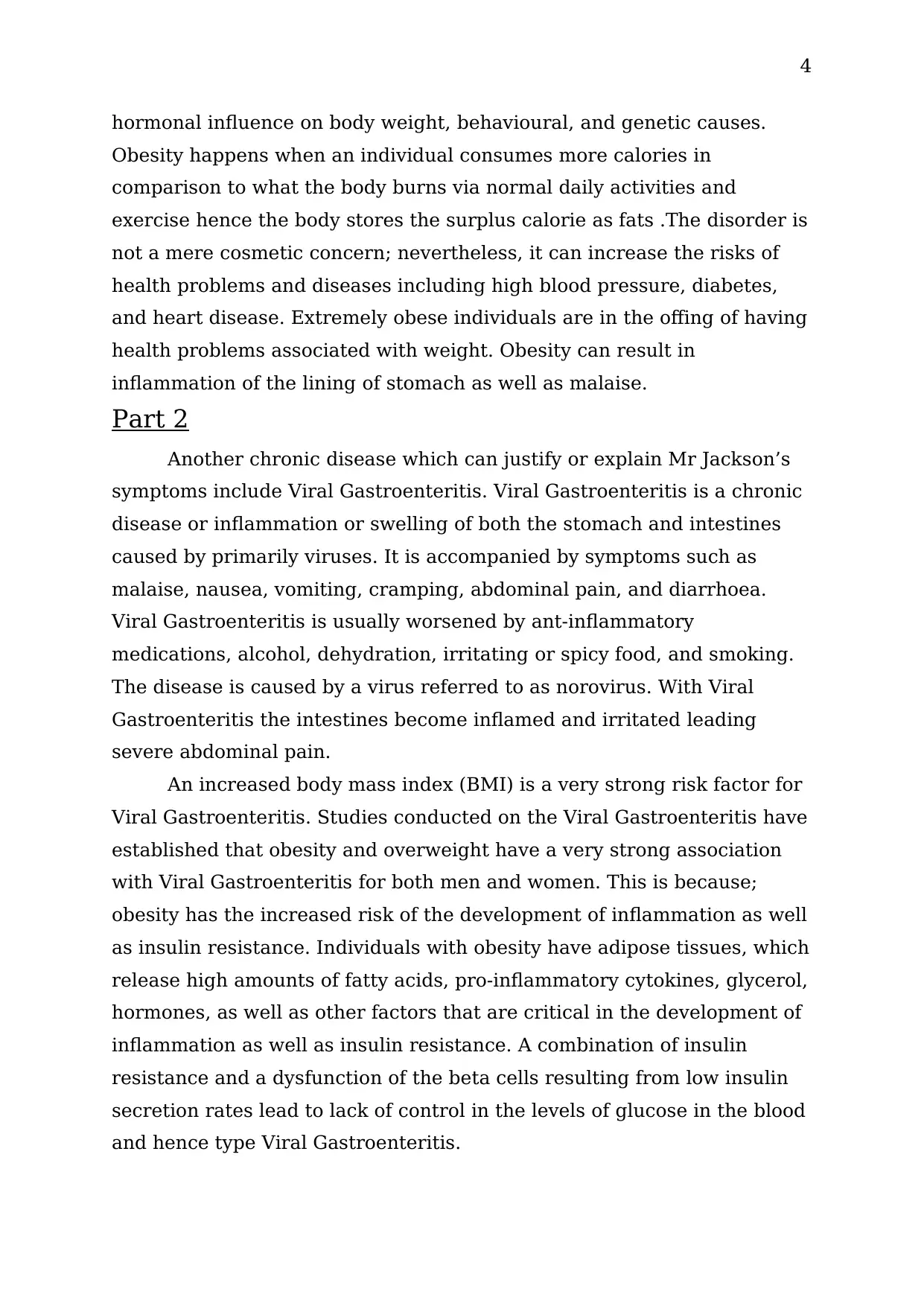
4
hormonal influence on body weight, behavioural, and genetic causes.
Obesity happens when an individual consumes more calories in
comparison to what the body burns via normal daily activities and
exercise hence the body stores the surplus calorie as fats .The disorder is
not a mere cosmetic concern; nevertheless, it can increase the risks of
health problems and diseases including high blood pressure, diabetes,
and heart disease. Extremely obese individuals are in the offing of having
health problems associated with weight. Obesity can result in
inflammation of the lining of stomach as well as malaise.
Part 2
Another chronic disease which can justify or explain Mr Jackson’s
symptoms include Viral Gastroenteritis. Viral Gastroenteritis is a chronic
disease or inflammation or swelling of both the stomach and intestines
caused by primarily viruses. It is accompanied by symptoms such as
malaise, nausea, vomiting, cramping, abdominal pain, and diarrhoea.
Viral Gastroenteritis is usually worsened by ant-inflammatory
medications, alcohol, dehydration, irritating or spicy food, and smoking.
The disease is caused by a virus referred to as norovirus. With Viral
Gastroenteritis the intestines become inflamed and irritated leading
severe abdominal pain.
An increased body mass index (BMI) is a very strong risk factor for
Viral Gastroenteritis. Studies conducted on the Viral Gastroenteritis have
established that obesity and overweight have a very strong association
with Viral Gastroenteritis for both men and women. This is because;
obesity has the increased risk of the development of inflammation as well
as insulin resistance. Individuals with obesity have adipose tissues, which
release high amounts of fatty acids, pro-inflammatory cytokines, glycerol,
hormones, as well as other factors that are critical in the development of
inflammation as well as insulin resistance. A combination of insulin
resistance and a dysfunction of the beta cells resulting from low insulin
secretion rates lead to lack of control in the levels of glucose in the blood
and hence type Viral Gastroenteritis.
hormonal influence on body weight, behavioural, and genetic causes.
Obesity happens when an individual consumes more calories in
comparison to what the body burns via normal daily activities and
exercise hence the body stores the surplus calorie as fats .The disorder is
not a mere cosmetic concern; nevertheless, it can increase the risks of
health problems and diseases including high blood pressure, diabetes,
and heart disease. Extremely obese individuals are in the offing of having
health problems associated with weight. Obesity can result in
inflammation of the lining of stomach as well as malaise.
Part 2
Another chronic disease which can justify or explain Mr Jackson’s
symptoms include Viral Gastroenteritis. Viral Gastroenteritis is a chronic
disease or inflammation or swelling of both the stomach and intestines
caused by primarily viruses. It is accompanied by symptoms such as
malaise, nausea, vomiting, cramping, abdominal pain, and diarrhoea.
Viral Gastroenteritis is usually worsened by ant-inflammatory
medications, alcohol, dehydration, irritating or spicy food, and smoking.
The disease is caused by a virus referred to as norovirus. With Viral
Gastroenteritis the intestines become inflamed and irritated leading
severe abdominal pain.
An increased body mass index (BMI) is a very strong risk factor for
Viral Gastroenteritis. Studies conducted on the Viral Gastroenteritis have
established that obesity and overweight have a very strong association
with Viral Gastroenteritis for both men and women. This is because;
obesity has the increased risk of the development of inflammation as well
as insulin resistance. Individuals with obesity have adipose tissues, which
release high amounts of fatty acids, pro-inflammatory cytokines, glycerol,
hormones, as well as other factors that are critical in the development of
inflammation as well as insulin resistance. A combination of insulin
resistance and a dysfunction of the beta cells resulting from low insulin
secretion rates lead to lack of control in the levels of glucose in the blood
and hence type Viral Gastroenteritis.
Paraphrase This Document
Need a fresh take? Get an instant paraphrase of this document with our AI Paraphraser
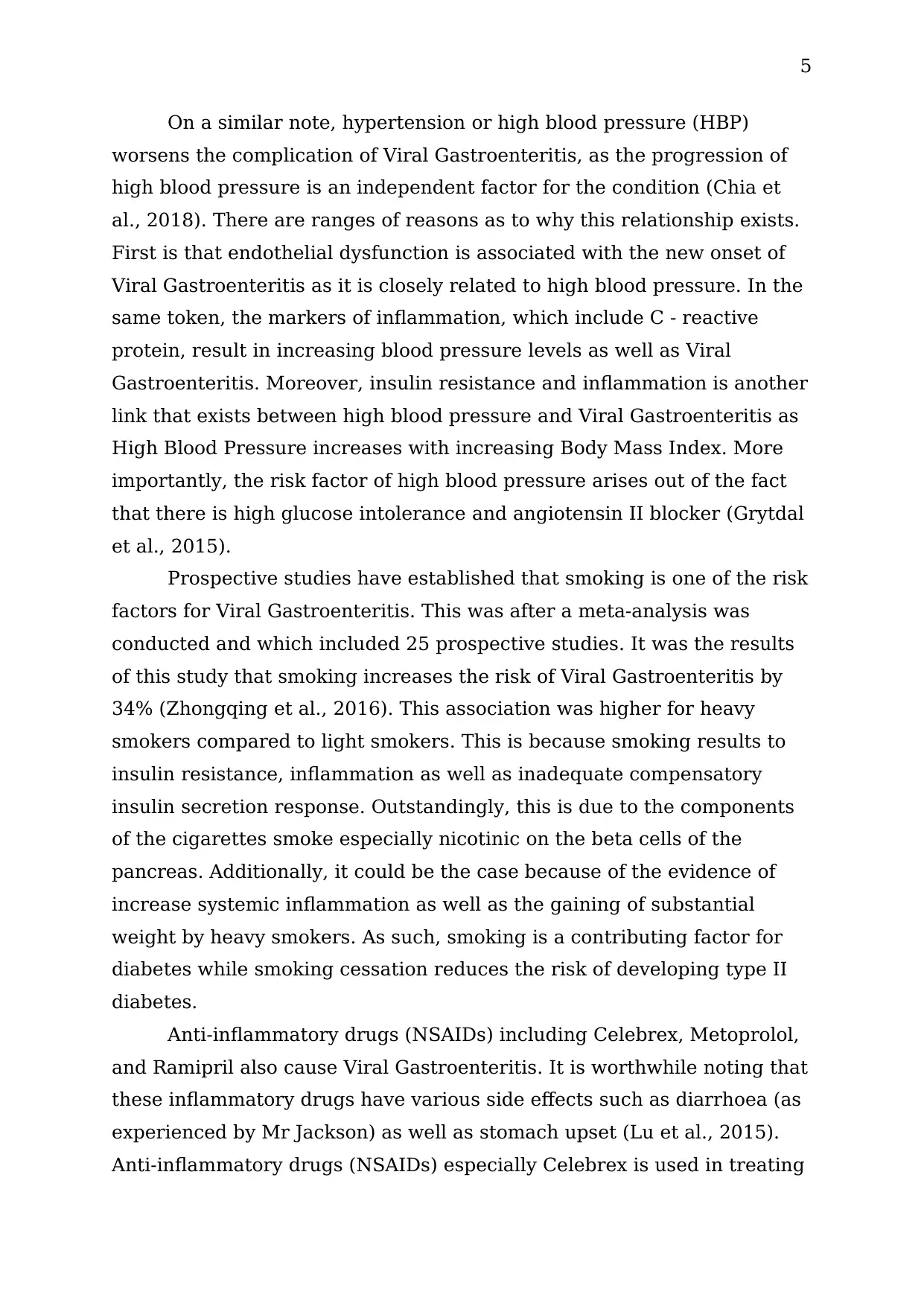
5
On a similar note, hypertension or high blood pressure (HBP)
worsens the complication of Viral Gastroenteritis, as the progression of
high blood pressure is an independent factor for the condition (Chia et
al., 2018). There are ranges of reasons as to why this relationship exists.
First is that endothelial dysfunction is associated with the new onset of
Viral Gastroenteritis as it is closely related to high blood pressure. In the
same token, the markers of inflammation, which include C - reactive
protein, result in increasing blood pressure levels as well as Viral
Gastroenteritis. Moreover, insulin resistance and inflammation is another
link that exists between high blood pressure and Viral Gastroenteritis as
High Blood Pressure increases with increasing Body Mass Index. More
importantly, the risk factor of high blood pressure arises out of the fact
that there is high glucose intolerance and angiotensin II blocker (Grytdal
et al., 2015).
Prospective studies have established that smoking is one of the risk
factors for Viral Gastroenteritis. This was after a meta-analysis was
conducted and which included 25 prospective studies. It was the results
of this study that smoking increases the risk of Viral Gastroenteritis by
34% (Zhongqing et al., 2016). This association was higher for heavy
smokers compared to light smokers. This is because smoking results to
insulin resistance, inflammation as well as inadequate compensatory
insulin secretion response. Outstandingly, this is due to the components
of the cigarettes smoke especially nicotinic on the beta cells of the
pancreas. Additionally, it could be the case because of the evidence of
increase systemic inflammation as well as the gaining of substantial
weight by heavy smokers. As such, smoking is a contributing factor for
diabetes while smoking cessation reduces the risk of developing type II
diabetes.
Anti-inflammatory drugs (NSAIDs) including Celebrex, Metoprolol,
and Ramipril also cause Viral Gastroenteritis. It is worthwhile noting that
these inflammatory drugs have various side effects such as diarrhoea (as
experienced by Mr Jackson) as well as stomach upset (Lu et al., 2015).
Anti-inflammatory drugs (NSAIDs) especially Celebrex is used in treating
On a similar note, hypertension or high blood pressure (HBP)
worsens the complication of Viral Gastroenteritis, as the progression of
high blood pressure is an independent factor for the condition (Chia et
al., 2018). There are ranges of reasons as to why this relationship exists.
First is that endothelial dysfunction is associated with the new onset of
Viral Gastroenteritis as it is closely related to high blood pressure. In the
same token, the markers of inflammation, which include C - reactive
protein, result in increasing blood pressure levels as well as Viral
Gastroenteritis. Moreover, insulin resistance and inflammation is another
link that exists between high blood pressure and Viral Gastroenteritis as
High Blood Pressure increases with increasing Body Mass Index. More
importantly, the risk factor of high blood pressure arises out of the fact
that there is high glucose intolerance and angiotensin II blocker (Grytdal
et al., 2015).
Prospective studies have established that smoking is one of the risk
factors for Viral Gastroenteritis. This was after a meta-analysis was
conducted and which included 25 prospective studies. It was the results
of this study that smoking increases the risk of Viral Gastroenteritis by
34% (Zhongqing et al., 2016). This association was higher for heavy
smokers compared to light smokers. This is because smoking results to
insulin resistance, inflammation as well as inadequate compensatory
insulin secretion response. Outstandingly, this is due to the components
of the cigarettes smoke especially nicotinic on the beta cells of the
pancreas. Additionally, it could be the case because of the evidence of
increase systemic inflammation as well as the gaining of substantial
weight by heavy smokers. As such, smoking is a contributing factor for
diabetes while smoking cessation reduces the risk of developing type II
diabetes.
Anti-inflammatory drugs (NSAIDs) including Celebrex, Metoprolol,
and Ramipril also cause Viral Gastroenteritis. It is worthwhile noting that
these inflammatory drugs have various side effects such as diarrhoea (as
experienced by Mr Jackson) as well as stomach upset (Lu et al., 2015).
Anti-inflammatory drugs (NSAIDs) especially Celebrex is used in treating
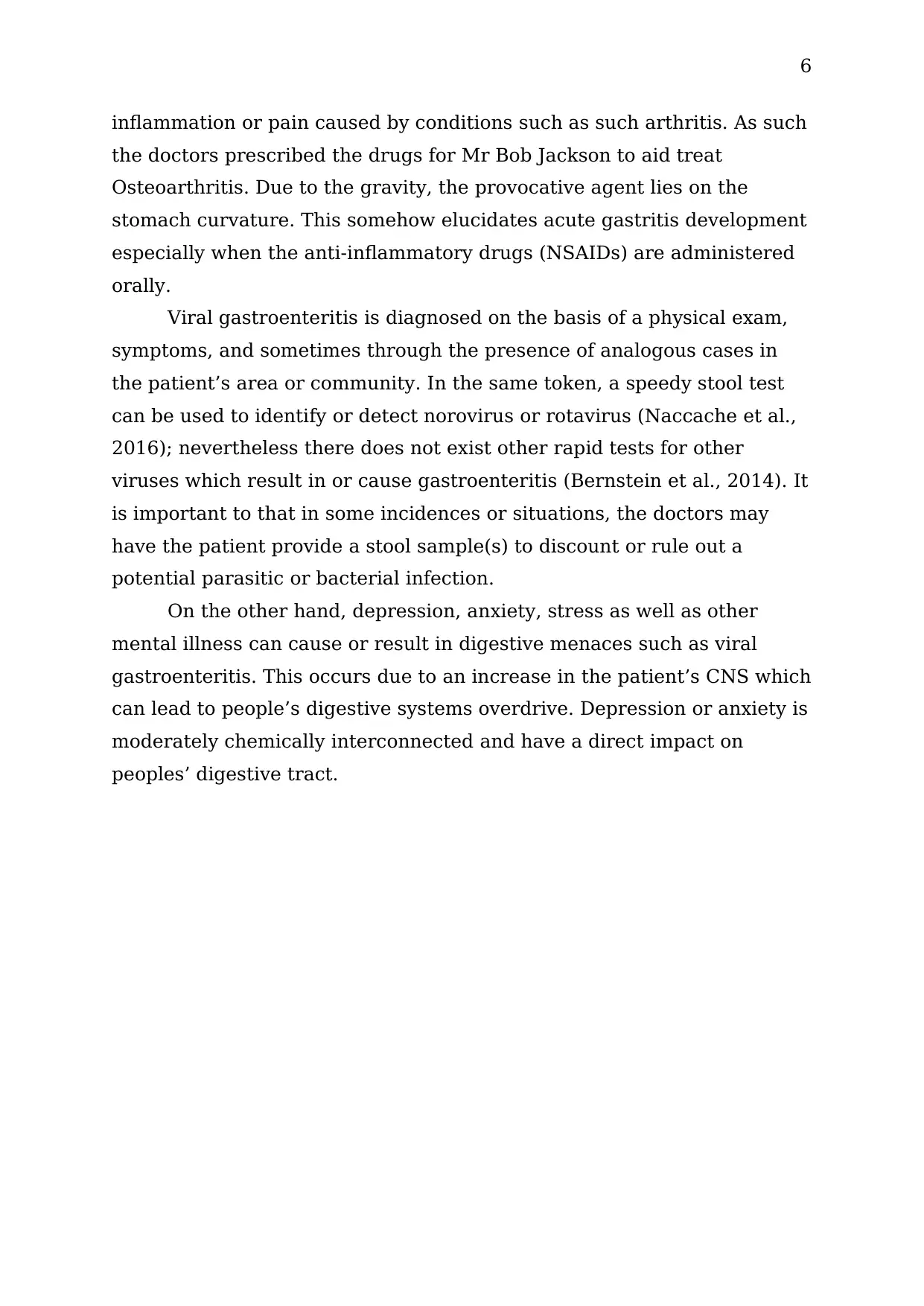
6
inflammation or pain caused by conditions such as such arthritis. As such
the doctors prescribed the drugs for Mr Bob Jackson to aid treat
Osteoarthritis. Due to the gravity, the provocative agent lies on the
stomach curvature. This somehow elucidates acute gastritis development
especially when the anti-inflammatory drugs (NSAIDs) are administered
orally.
Viral gastroenteritis is diagnosed on the basis of a physical exam,
symptoms, and sometimes through the presence of analogous cases in
the patient’s area or community. In the same token, a speedy stool test
can be used to identify or detect norovirus or rotavirus (Naccache et al.,
2016); nevertheless there does not exist other rapid tests for other
viruses which result in or cause gastroenteritis (Bernstein et al., 2014). It
is important to that in some incidences or situations, the doctors may
have the patient provide a stool sample(s) to discount or rule out a
potential parasitic or bacterial infection.
On the other hand, depression, anxiety, stress as well as other
mental illness can cause or result in digestive menaces such as viral
gastroenteritis. This occurs due to an increase in the patient’s CNS which
can lead to people’s digestive systems overdrive. Depression or anxiety is
moderately chemically interconnected and have a direct impact on
peoples’ digestive tract.
inflammation or pain caused by conditions such as such arthritis. As such
the doctors prescribed the drugs for Mr Bob Jackson to aid treat
Osteoarthritis. Due to the gravity, the provocative agent lies on the
stomach curvature. This somehow elucidates acute gastritis development
especially when the anti-inflammatory drugs (NSAIDs) are administered
orally.
Viral gastroenteritis is diagnosed on the basis of a physical exam,
symptoms, and sometimes through the presence of analogous cases in
the patient’s area or community. In the same token, a speedy stool test
can be used to identify or detect norovirus or rotavirus (Naccache et al.,
2016); nevertheless there does not exist other rapid tests for other
viruses which result in or cause gastroenteritis (Bernstein et al., 2014). It
is important to that in some incidences or situations, the doctors may
have the patient provide a stool sample(s) to discount or rule out a
potential parasitic or bacterial infection.
On the other hand, depression, anxiety, stress as well as other
mental illness can cause or result in digestive menaces such as viral
gastroenteritis. This occurs due to an increase in the patient’s CNS which
can lead to people’s digestive systems overdrive. Depression or anxiety is
moderately chemically interconnected and have a direct impact on
peoples’ digestive tract.
⊘ This is a preview!⊘
Do you want full access?
Subscribe today to unlock all pages.

Trusted by 1+ million students worldwide
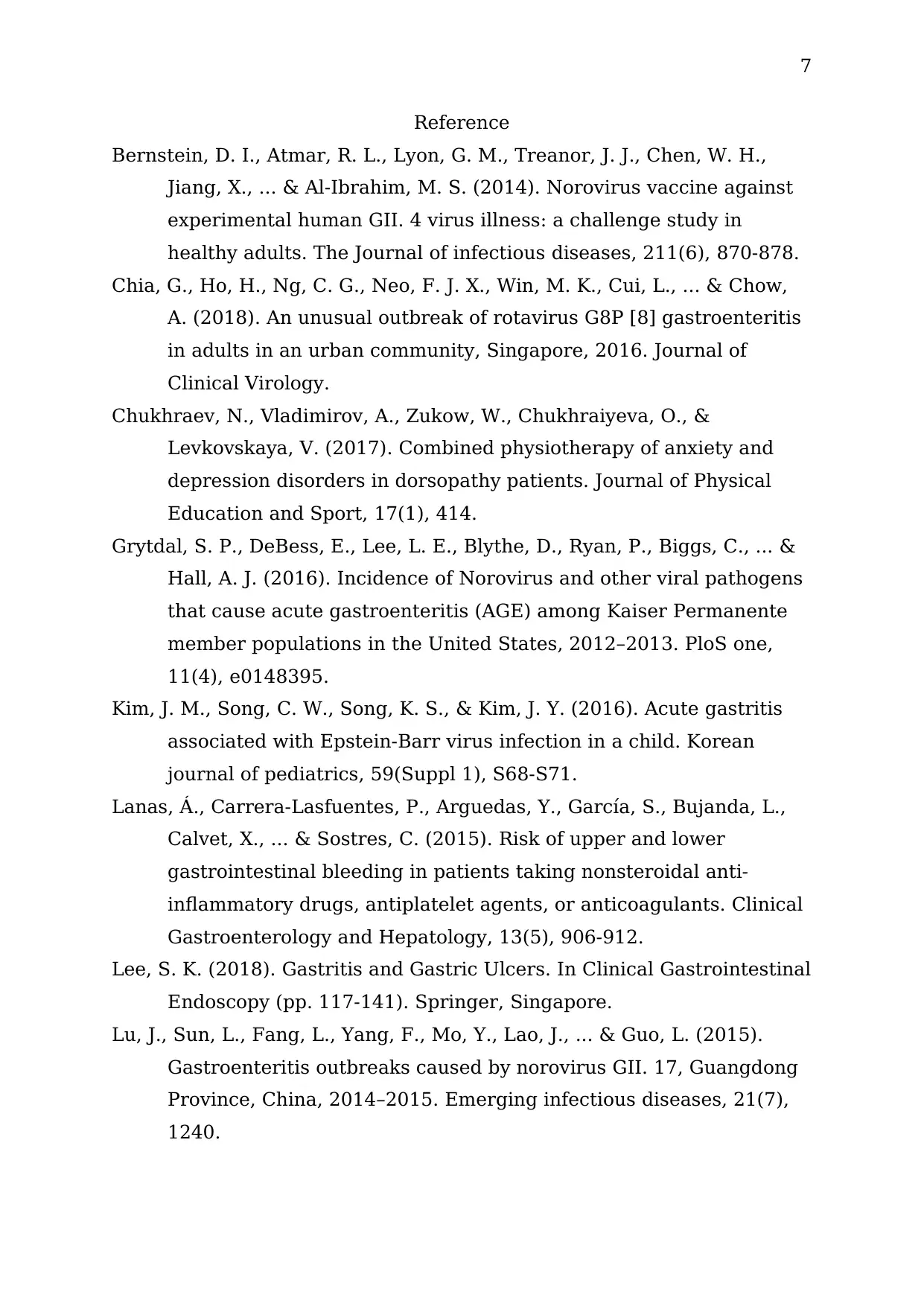
7
Reference
Bernstein, D. I., Atmar, R. L., Lyon, G. M., Treanor, J. J., Chen, W. H.,
Jiang, X., ... & Al-Ibrahim, M. S. (2014). Norovirus vaccine against
experimental human GII. 4 virus illness: a challenge study in
healthy adults. The Journal of infectious diseases, 211(6), 870-878.
Chia, G., Ho, H., Ng, C. G., Neo, F. J. X., Win, M. K., Cui, L., ... & Chow,
A. (2018). An unusual outbreak of rotavirus G8P [8] gastroenteritis
in adults in an urban community, Singapore, 2016. Journal of
Clinical Virology.
Chukhraev, N., Vladimirov, A., Zukow, W., Chukhraiyeva, O., &
Levkovskaya, V. (2017). Combined physiotherapy of anxiety and
depression disorders in dorsopathy patients. Journal of Physical
Education and Sport, 17(1), 414.
Grytdal, S. P., DeBess, E., Lee, L. E., Blythe, D., Ryan, P., Biggs, C., ... &
Hall, A. J. (2016). Incidence of Norovirus and other viral pathogens
that cause acute gastroenteritis (AGE) among Kaiser Permanente
member populations in the United States, 2012–2013. PloS one,
11(4), e0148395.
Kim, J. M., Song, C. W., Song, K. S., & Kim, J. Y. (2016). Acute gastritis
associated with Epstein-Barr virus infection in a child. Korean
journal of pediatrics, 59(Suppl 1), S68-S71.
Lanas, Á., Carrera-Lasfuentes, P., Arguedas, Y., García, S., Bujanda, L.,
Calvet, X., ... & Sostres, C. (2015). Risk of upper and lower
gastrointestinal bleeding in patients taking nonsteroidal anti-
inflammatory drugs, antiplatelet agents, or anticoagulants. Clinical
Gastroenterology and Hepatology, 13(5), 906-912.
Lee, S. K. (2018). Gastritis and Gastric Ulcers. In Clinical Gastrointestinal
Endoscopy (pp. 117-141). Springer, Singapore.
Lu, J., Sun, L., Fang, L., Yang, F., Mo, Y., Lao, J., ... & Guo, L. (2015).
Gastroenteritis outbreaks caused by norovirus GII. 17, Guangdong
Province, China, 2014–2015. Emerging infectious diseases, 21(7),
1240.
Reference
Bernstein, D. I., Atmar, R. L., Lyon, G. M., Treanor, J. J., Chen, W. H.,
Jiang, X., ... & Al-Ibrahim, M. S. (2014). Norovirus vaccine against
experimental human GII. 4 virus illness: a challenge study in
healthy adults. The Journal of infectious diseases, 211(6), 870-878.
Chia, G., Ho, H., Ng, C. G., Neo, F. J. X., Win, M. K., Cui, L., ... & Chow,
A. (2018). An unusual outbreak of rotavirus G8P [8] gastroenteritis
in adults in an urban community, Singapore, 2016. Journal of
Clinical Virology.
Chukhraev, N., Vladimirov, A., Zukow, W., Chukhraiyeva, O., &
Levkovskaya, V. (2017). Combined physiotherapy of anxiety and
depression disorders in dorsopathy patients. Journal of Physical
Education and Sport, 17(1), 414.
Grytdal, S. P., DeBess, E., Lee, L. E., Blythe, D., Ryan, P., Biggs, C., ... &
Hall, A. J. (2016). Incidence of Norovirus and other viral pathogens
that cause acute gastroenteritis (AGE) among Kaiser Permanente
member populations in the United States, 2012–2013. PloS one,
11(4), e0148395.
Kim, J. M., Song, C. W., Song, K. S., & Kim, J. Y. (2016). Acute gastritis
associated with Epstein-Barr virus infection in a child. Korean
journal of pediatrics, 59(Suppl 1), S68-S71.
Lanas, Á., Carrera-Lasfuentes, P., Arguedas, Y., García, S., Bujanda, L.,
Calvet, X., ... & Sostres, C. (2015). Risk of upper and lower
gastrointestinal bleeding in patients taking nonsteroidal anti-
inflammatory drugs, antiplatelet agents, or anticoagulants. Clinical
Gastroenterology and Hepatology, 13(5), 906-912.
Lee, S. K. (2018). Gastritis and Gastric Ulcers. In Clinical Gastrointestinal
Endoscopy (pp. 117-141). Springer, Singapore.
Lu, J., Sun, L., Fang, L., Yang, F., Mo, Y., Lao, J., ... & Guo, L. (2015).
Gastroenteritis outbreaks caused by norovirus GII. 17, Guangdong
Province, China, 2014–2015. Emerging infectious diseases, 21(7),
1240.
Paraphrase This Document
Need a fresh take? Get an instant paraphrase of this document with our AI Paraphraser
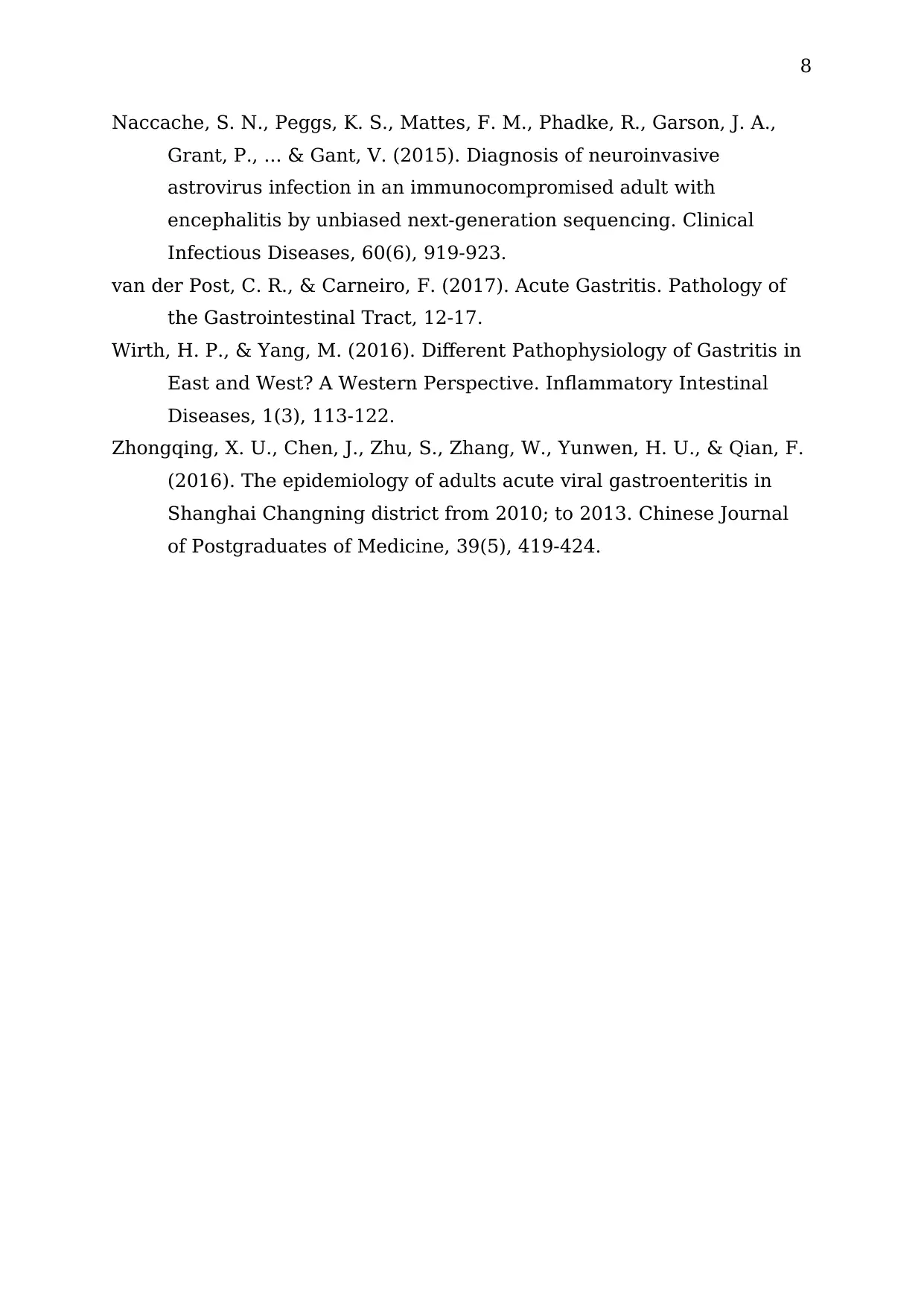
8
Naccache, S. N., Peggs, K. S., Mattes, F. M., Phadke, R., Garson, J. A.,
Grant, P., ... & Gant, V. (2015). Diagnosis of neuroinvasive
astrovirus infection in an immunocompromised adult with
encephalitis by unbiased next-generation sequencing. Clinical
Infectious Diseases, 60(6), 919-923.
van der Post, C. R., & Carneiro, F. (2017). Acute Gastritis. Pathology of
the Gastrointestinal Tract, 12-17.
Wirth, H. P., & Yang, M. (2016). Different Pathophysiology of Gastritis in
East and West? A Western Perspective. Inflammatory Intestinal
Diseases, 1(3), 113-122.
Zhongqing, X. U., Chen, J., Zhu, S., Zhang, W., Yunwen, H. U., & Qian, F.
(2016). The epidemiology of adults acute viral gastroenteritis in
Shanghai Changning district from 2010; to 2013. Chinese Journal
of Postgraduates of Medicine, 39(5), 419-424.
Naccache, S. N., Peggs, K. S., Mattes, F. M., Phadke, R., Garson, J. A.,
Grant, P., ... & Gant, V. (2015). Diagnosis of neuroinvasive
astrovirus infection in an immunocompromised adult with
encephalitis by unbiased next-generation sequencing. Clinical
Infectious Diseases, 60(6), 919-923.
van der Post, C. R., & Carneiro, F. (2017). Acute Gastritis. Pathology of
the Gastrointestinal Tract, 12-17.
Wirth, H. P., & Yang, M. (2016). Different Pathophysiology of Gastritis in
East and West? A Western Perspective. Inflammatory Intestinal
Diseases, 1(3), 113-122.
Zhongqing, X. U., Chen, J., Zhu, S., Zhang, W., Yunwen, H. U., & Qian, F.
(2016). The epidemiology of adults acute viral gastroenteritis in
Shanghai Changning district from 2010; to 2013. Chinese Journal
of Postgraduates of Medicine, 39(5), 419-424.
1 out of 8
Related Documents
Your All-in-One AI-Powered Toolkit for Academic Success.
+13062052269
info@desklib.com
Available 24*7 on WhatsApp / Email
![[object Object]](/_next/static/media/star-bottom.7253800d.svg)
Unlock your academic potential
Copyright © 2020–2026 A2Z Services. All Rights Reserved. Developed and managed by ZUCOL.





